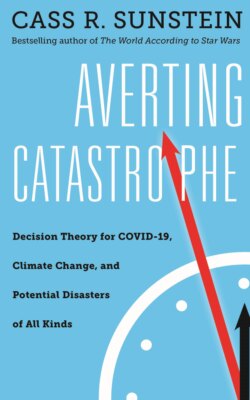Читать книгу Averting Catastrophe - Cass R. Sunstein - Страница 11
На сайте Литреса книга снята с продажи.
Assigning Probabilities
ОглавлениеTo understand the policy problem, or for that matter medical risks, we have to understand what it means to assign or to refuse to assign probabilities to future events. If a doctor refuses to do that, the simplest reason is that she lacks enough information. She might not have the data. She might think that no one does. (In the case of the medication to reduce the stroke risk, the doctor thought exactly that, in the sense that she believed that the science suggested that the medication would reduce the risk from 1.3% to 0.9% or well below, but without allowing assignment of probabilities.)
When someone refuses to assign probabilities, she might have a frequentist understanding of probability, in accordance with which she normally asks: In a large number of cases like this, how many times are there adverse health effects? This is the kind of question that someone might ask in assigning a probability to a fair coin coming up heads in 100 straight tosses, or a particular baby, born in Princeton, New Jersey, on August 29, turning out to be female. When a doctor or regulator refuses to assign probabilities, the reason might be that she is a frequentist, and she might not have the kinds of information that frequentists require.3
An alternative understanding of probability judgments is Bayesian, and it does not depend on knowledge of frequencies.4 It can even be used for singular or unique cases.5 Bayesian approaches might be used when someone says that the probability of a pandemic five years from now is under 2%, that the probability that the Democratic nominee for the US presidency will win is 50%, or that the probability of a particular set of outcomes in 2100, as a result of climate change, is over 90%. Bayesians start with a prior probability and then update on the basis of what they learn. Unlike frequentists, they are willing to assign probabilities to singular or nonrepeatable events. At the same time, a Bayesian doctor or regulator might agree that, in a particular case, any subjective probability that she assigns to an event is speculative in the extreme; she might acknowledge that she lacks sufficient information to have any confidence in it. For that reason, she might agree that the situation is one of Knightian uncertainty.
It is important to note that frequentists believe that for genuinely unique or nonrepeatable events, assignments of probability are essentially meaningless.6 In their view, we have no basis for assigning a probability when we lack a frequency distribution. To say that a particular Democratic nominee has a 50% chance of being president, or that climate change is 90% likely to cause specified damage by 2100, is to speak nonsense, unless either statement can plausibly be justified in frequentist terms. For frequentists, the problem of Knightian uncertainty is therefore pervasive; it exists whenever we are dealing with a unique or nonrepeating problem, and we are doing that much of the time.7
In my view, frequentists are unconvincing on that count. It is not nonsensical to specify a probability that an event will occur even if we do not have a frequency distribution. But it is unnecessary to defend that conclusion for present purposes. Bayesians should also be willing to agree that, in some circumstances, Knightian uncertainty does indeed exist (a point to which I will return).
